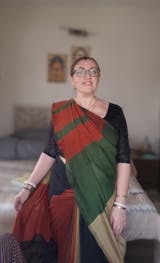When choosing a saree that feels as good as it looks, Malai Cotton emerges as a clear winner. Whether dressing for daily routines, working long hours, or simply wanting breathable elegance, a Malai Cotton saree delivers effortless grace with unmatched comfort. This blog explores what makes this fabric special, what it's made of, and why more Indian women are turning to Malai Cotton as their go-to summer essential. If you've ever wondered, “What is Malai Cotton, and why is everyone talking about it?” — you're in the right place.

What Is a Malai Cotton Saree?
A Malai Cotton saree is a lightweight, breathable, and ultra-soft saree made from a special blend of natural cotton fibers. It gets its name from its buttery-smooth texture — "Malai" means cream in Hindi, and this saree truly lives up to that name in feel. Ideal for hot, humid climates, Malai Cotton is especially loved across India for everyday and casual wear.
What Is Malai Cotton Made Of?
Malai Cotton is typically made from high-grade cotton fibers, sometimes blended with a small percentage of silk or modal for added softness and strength. The yarn undergoes a special spinning and weaving process that gives it a cream-like smoothness, making it different from regular cotton.

Key Characteristics:
-
Feather-light and smooth
-
Breathable and moisture-absorbent
-
Naturally draping and easy to wear all-day
Why Choose a Malai Cotton Saree?
1. Ideal for Indian Summers
The fabric breathes. That means it allows air to flow freely, keeping you cool even in 40-degree weather. Whether commuting or attending a summer pooja, Malai Cotton helps you stay fresh.
2. Soft on Skin
No itch. No stickiness. It's a smooth, second-skin feel that works even for sensitive skin. The creamy texture glides across your body — which is why many call it the most comfortable saree ever.
3. Everyday Elegance
You can wear a Malai Cotton saree at home, in the office, or at casual get-togethers. It’s easy to pleat, doesn't crumple easily, and comes in elegant prints, solids, or minimal embroidery. It's the kind of saree you'll reach for again and again.
Malai Cotton vs Regular Cotton
|
Feature |
Malai Cotton |
Regular Cotton |
|
Texture |
Silky-smooth |
Slightly coarse |
|
Breathability |
High |
High |
|
Ideal Season |
Summer, humid weather |
All seasons |
|
Daily Wear Comfort |
Excellent |
Good |
|
Drape & Flow |
Natural, soft fall |
Slightly stiff |
Styling Tips for Malai Cotton Sarees
-
Minimal Accessories: The fabric shines on its own. Pair with light silver or pearl jewelry.
-
Pastel Colors: Look for muted tones like sage, ivory, or blush for a chic summer vibe.
-
Blouse Match: Pair with a sleeveless cotton blouse for maximum comfort.
Who Should Wear a Malai Cotton Saree?
If you:
-
Sweat easily in summer
-
Prefer low-maintenance daily wear.
-
Want a saree that combines grace with practicality?
...then Malai Cotton sarees are your perfect fit. They’re especially loved by schoolteachers, working professionals, and homemakers looking for breathable options that don't compromise elegance.
Where to Buy Malai Cotton Sarees
Malai Cotton sarees are available at most modern Indian ethnic brands, boutique stores, and online platforms. Look for verified handloom tags or pure cotton blends to ensure you get the real deal.
where summer stretches across months, a Malai Cotton saree is more than just a fashion choice — an innovative, skin-friendly solution. With comfort as its crown jewel and timeless simplicity as its style, it’s no wonder this fabric is becoming a staple in modern wardrobes.



